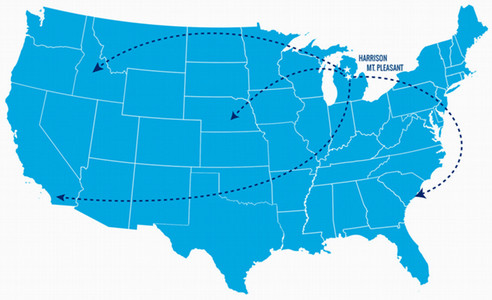Public Health

Are you eager to make a positive impact by helping others stay healthy? Mid’s Public Health Pathways prepare you to connect people to services and expand their awareness of health-related issues. Our transfer-focused pathway prepares you to pursue an advanced degree. Mid’s career-ready option allows you to build employable skills for entry-level positions, and transfers 50 credits into Central Michigan University’s Bachelor’s Degree, allowing you to work while you pursue an advanced degree.

Mid credits go with you because we participate in many transfer agreements that ensure our courses count at colleges and universities across the state and country. Our team can help you select the courses that best fit your goals—saving you time and money. No matter where your path leads, Mid can be a part of your journey.
Starting at Mid and transferring to a four-year school can save you, on average, over $16,000 off the cost of your bachelor’s degree.*
You’re worried that Mid credits won’t transfer. We get it, this is a big concern. The good news? You don’t need to worry! By starting with your end goal in mind, we customize a transfer-focused pathway that works for you and your intended destination college or university.
Preparing for a career after you graduate? That’s great! Mid students often complete internships and earn industry-recognized certifications that prepare them for real-world work.
And along the way, you’ll receive personalized advice from your Mid Mentor and support from teams across the College who are committed to your success.
Career-Ready Pathways
Mid’s Public Health Pathway prepares you to successfully connect people to services in their community and expand their awareness of health-related issues. Mid’s Associate in Applied Science degree is built to transfer 50 credits directly into Central Michigan University’s Bachelor of Public Health Degree, giving you the opportunity to work in the field as you continue to advance your career.
Transfer-Focused Pathways
Mid’s Public Health MiTransfer Pathway is recognized by the Michigan Transfer Network and contains courses that transfer to multiple colleges and universities throughout Michigan. This pathway prepares you to successfully pursue advanced public health-related degrees with a solid foundation of knowledge and skills.
Students often work in careers like
Public Health can also provide the foundation for careers in other fields. These and other careers often require additional education or training, sometimes beyond an associate or bachelor’s degree.
Research more careers using O*NET OnLine, a top career tool used by job seekers, employers, and more.
Save $ Starting at Mid can save you over $16,000 off the cost of a bachelor’s degree.
Succeed Mid Mentors provide personalized support throughout your journey at Mid.
Mid’s faculty come from a variety of backgrounds, bringing real-world experiences into the classroom. This means that you learn from more than textbooks. And we carefully tailor teaching strategies to ensure you are ready to succeed.
Our personalized approach to success ensures that you're not just a number. Our instructors learn your name, because our class sizes are small, and your Mid Mentor serves as your single-point-of-contact from application to graduation. We succeed when you succeed, so our investment in your success is personal.
Mid's associate degree pathways allow you to gain a solid foundation of skills in the field, alongside general education credits that promote broad knowledge and deep understanding. Our training credential and certificate options provide necessary skills for entry-level positions, and often ladder credits into associate degree pathways—saving you time and money if you choose to advance your skills.
Mid offers a wide range of courses through several delivery methods. From on-campus to online and options that let you choose how to attend each course session, you can attend in ways that match your learning style and busy schedule.
The Michigan Transfer Network allows you to view transfer course equivalencies between many colleges and universities in Michigan. If you would like to go back to school, transfer to another college or university in Michigan, or simply see how courses at Mid would transfer to another school, this site is for you!
Public health workers increase health knowledge and self-sufficiency within communities through a range of activities such as outreach, community education, informal counseling, social support, and advocacy (American Public Health Association, 2009).
They often assist in health system navigation; address barriers to care; and provide care coordination through referrals for needs such as food, housing, education, and mental health services.
Public Health Workers are cross-trained to perform both administrative and customer service duties. They have a clear understanding of professional boundaries, and the services available in the local area.
These knowledgeable, compassionate individuals find fulfilling careers in medical offices and clinics, hospitals, non-profits, and government agencies, and play a key role in helping individuals gain confidence in managing their own health.
Over 100 Programs & Pathways offer students a wide range of career-ready and transfer-focused academic options. From hands-on learning in state-of-the-art labs to meaningful discussions on current topics and technologies, you’ll be prepared for your next step and future career.
*Source: IPEDS Data Feedback Report. Savings compare the median 2021-2022 tuition and required fees for an academic year at public Michigan universities with Mid Michigan College, calculated for full-time, first-time degree/certificate-seeking undergraduates. The tuition and required fees shown here are the lowest reported from the categories of in-district, in-state, and out-of-state. Visit each college or university website for current tuition information.
Job outlook data sourced from O*Net OnLine and valid 2020-2030.